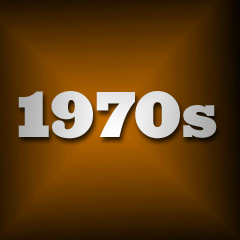
|
![]()
Greatest Films of the 1970s
1970 | 1971 | 1972 | 1973 | 1974 | 1975 | 1976 | 1977 | 1978 | 1979
Title Screen Film Genre(s), Title, Year, (Country), Length, Director, Description 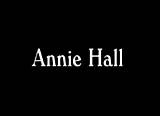


Annie Hall (1977), 93 minutes, D: Woody Allen
Actor/director/co-writer Woody Allen's bittersweet, cerebral, stream-of-consciousness, 70s, urban romantic comedy was a Best Picture-winner. It also won Oscars for Best Director, Best Actress, and Best Original Screenplay. After a string of cheaply-made, absurdist, and episodic gag-filled comedies (such as Take the Money and Run (1969), Bananas (1971), and Sleeper (1973)), he finally came up with a more disciplined film about a New York couple's neurotic and bittersweet love affair. Many considered this to be Woody Allen's best work, and a transition from his earlier film attempts to a richer, more thoughtful consideration of relationships. It was innovatively filmed with a variety of techniques, including animated segments, the balcony scene of "mental subtitles," flashbacks, monologues directly toward the camera, split-screen, fantasy (in a scene with media guru Marshall McLuhan), and other unique elements. In the plot, kvetchy, Jewish, neurotic, pessimistic, Brooklyn stand-up comedian Alvy Singer (Woody Allen), involved in therapy due in part to his death obsession, wistfully recalled and remembered his bygone relationship (now broken-up) with flighty, adorable, ditzy, clumsy and irrepressibly Midwesterner Annie Hall (Diane Keaton) from Wisconsin - an aspiring singer and photographer. [Note: The film marked the fourth pairing of Keaton and Allen, who were also an off-screen couple at the time.] At one point earlier in Alvy's life, seen in flashbacks, he spoke about his first wife - politically-active Jewess Allison Portchnik (Carol Kane). At first the conflicting cultural gap between Alvy and Annie seemed insurmountable, but despite their differences, they fell in love after first meeting at a tennis club. As they got to know one another, they invariably attempted to change each other (Alvy questioned Annie's intelligence), causing friction and then eventually leading to their break-up. The film watched them try new relationships, as they reluctantly pulled away from each other. Annie went to live in LA with record producer Tony Lacey (singer Paul Simon), while Alvy went to try and retrieve her (and showed his utter disdain for California). The film, in actuality, was semi-autobiographical and chronicled the end of their real-life relationship. By film's end about a year after their relationship ended, they met up in New York for lunch as friends (they were each dating other people) and reminisced about old times. Alvy concluded the film with a flashbacked philosophical ending and chicken joke - he summed up an understanding of how relationships were utterly absurd and that love inevitably faded, although people still craved relationships.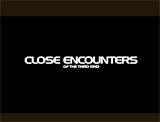


Close Encounters of the Third Kind (1977), 135 minutes, D: Steven Spielberg
Director Steven Spielberg's science-fiction epic and adventure story told about the mysteries of UFO and extra-terrestrial appearances. A Middle-American from Indiana Roy Neary (Richard Dreyfuss), a utilities lineman, was confronted by a UFO on a deserted road at night as he investigated a power outage - a near-religious, life-transforming experience. Afterwards, he became obsessed with unexplained, mountainous shapes, and five musical notes. By piecing together clues, he was ultimately led to a rendezvous on Devils Tower in Wyoming with Jillian (Melinda Dillon), a mother whose young boy Barry (Cary Guffey) was kidnapped by the aliens. There in the exhilarating climax, they witnessed an arriving spacecraft, the dazzling mother-ship, greeted by a top-secret scientific establishment led by Claude Lacombe (Francois Truffaut).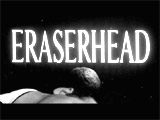


Eraserhead (1977), 100 minutes, D: David Lynch
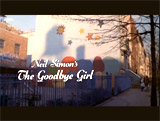


The Goodbye Girl (1977), 111 minutes, D: Herbert Ross
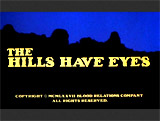

The Hills Have Eyes (1977), 89 minutes, D: Wes Craven
Wes Craven's follow-up feature to his debut, barrier-breaking, controversial horror flick The Last House on the Left (1972) was this outrageous and savage story about a degenerate, inbred, cave-dwelling cannibalistic family of marauders hiding in the desert hills. In contrast was the suburban family that they preyed upon - the vulnerable, vacationing Carter and Wood families stranded off the "main road." Emphasis was placed on the class-war conflict between the two groups: the remaining survivors of the civilized families and the mutant, feral family. Craven toned down some of the gore and violence, although there was still rape, baby-kidnapping, gun murder, crucifixion-burning, the chomping of a pet parakeet head, stabbings, a dog attack, and a rattlesnake-bite induced death. Director Craven even added elements of black comedy (Ethel's hysterical exclamation about her charred husband's body: "That's not my Bob!"). The tagline gave away Craven's approach - show an innocent family transgressing and forced to kill to survive: "A nice American family. They didn't want to kill. But they didn't want to die." Craven's final blood-red freeze-frame emphasized that self-defense had crossed the line toward sadistic revenge.

Julia (1977), 116 minutes, D: Fred Zinnemann

Killer of Sheep (1977), 90 minutes, D: Charles Burnett
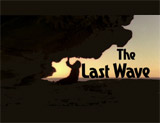



The Last Wave (1977, Australia), 106 minutes, D: Peter Weir
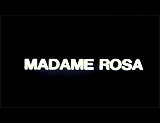
Madame Rosa (1977, Fr.) (aka La Vie Devant Soi), 105 minutes, D: Moshé Mizrahi
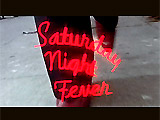


Saturday Night Fever (1977), 119 minutes, D: John Badham
John Badham's melodramatic, out-dated, coming-of-age film was the biggest musical sensation and blockbuster of the late 1970's (from co-producer Robert Stigwood) - adapted by screenwriter Norman Wexler from Nik Cohn's New York Magazine story "Tribal Rites of the New Saturday Night." (A PG-rated version was released without the coarse language and explicit sex scenes.) The musical drama-dance film featured one of the most famous and successful song soundtracks in film history, and was responsible for the Disco Craze phenomenon, launching hot disco clubs (like Studio 54) and the film super-stardom of 19-year old John Travolta, previously best known as one of the Sweathogs of the television sitcom Welcome Back, Kotter. The film's soundtrack had become one of the most recognizable, with a slew of high-pitched Bee Gees songs from the Gibbs brothers: "Night Fever," "How Deep is Your Love," "More Than a Woman," and "You Should Be Dancin'." Additional popular songs on the soundtrack included Yvonne Elliman's "If I Can't Have You" and the Trammps' "Disco Inferno." Unbelievably, the soundtrack was completely ignored by the Academy, causing a critical outcry. In the memorable opening scene, conflicted, 19 year-old, vulgar, teenaged, working-class Italian-American anti-hero from Brooklyn, Anthony "Tony" Manero (John Travolta with the film's sole Oscar nomination) strutted down the sidewalk to the lyrics of "Stayin' Alive": "Oh, you can tell by the way I walk / I'm a woman's man, no time to talk." He worked in a lowly, dead-end job as a clerk in the paint department of a local hardware store and lived at home with his oppressive, suffocating, and verbally-abusive blue-collar family. His entire family often downgraded Tony in comparison to his older brother - Catholic priest Frank, Jr. (Martin Shakar) (who eventually decided to leave the priesthood). After dark (and especially on Friday and Saturday nights), however, Tony became the dynamic, white polyester-clad stud (with platform shoes, flared pants, and a wide-collared shirt) and undisputed dancing legend of a local nightclub (the 2001 Odyssey). On the weekend, with his gang of loutish, uneducated and unambitious friends, including Joey (Joseph Call), Double J. (Paul Pape), and Bobby C. (Barry Miller), Tony entered the disco hall personifying royalty, and oozing macho sexual virility and arrogance. Manero sought escape from his desperate plight of a staid home life by finding recognition on the dance floor. One of the regulars at the 2001 club was slightly chubby Annette (Donna Pescow) Tony's most adoring, on-again/off-again admirer-girlfriend, with whom Tony kept a platonic relationship. She wanted the two of them to partner up for the Odyssey's dance competition. Tony's troubled character, with flashes of racism, immaturity, obnoxiousness, and misogyny, was evident in his frequent sexual abuse and disregard for Annette. He quickly became impressed by a new club member, the very talented and skilled dancer Stephanie Mangano (Karen Lynn Gorney) wearing white. When Tony was able to have a substantial conversation with Stephanie in the Phillips' Dance Studio and at a restaurant, he learned that she was working her way up in a show business agency in Manhattan, and was more independent-minded and intelligent than all of his previous female friends. She accepted his offer to partner with him for the club's city-wide dance contest, although he had already promised Annette to pair up with him and had practiced with her. Stephanie insisted that she would keep him at arm's length and only remain professional: ("Nothing personal...I don't wantcha comin' on to me"). The climactic musical highlight was the club's dance competition, with teams from around the city competing for the $500 prize. After Tony (wearing a white-suit and black shirt) and Stephanie's performance (to the tune of "More Than a Woman"), they won first prize, but Tony felt that a Puerto Rican couple who performed the Mambo (and placed second) were better dancers, and handed over his trophy and award money to them. Later that evening, Tony joined his intoxicated buddies with Annette, who was double-raped by Joey and then Double J. in the back seat of their car as they drove to visit the Verrazzano-Narrows bridge. There, Bobby (who was depressed over impregnating his Catholic girlfriend) carelessly and recklessly performed dare-devil stunts on the bridge cables and beams, slipped, and fell to his death. It proved to be a significant crossroads in Tony's coming-of-age - he spent the entire remainder of the night (riding on the subway and ending up in Manhattan) while he was contemplating leaving his old life (of fleeting dancing prowess on Saturday nights with his moronic "asshole" friends) and choosing a new life and future of work in the city. The film concluded with Stephanie and Tony apologizing to each other and re-establishing their relationship as "friends" (after his earlier near-rape attempt of her), after she admitted that she admired him and accepted his plan to leave Brooklyn and relocate in Manhattan to begin a new life.

Soldier of Orange (1977, Neth.) (aka Soldaat van Oranje), 165 minutes, D: Paul Verhoeven
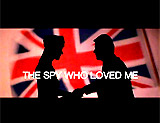

The Spy Who Loved Me (1977, UK), 125 minutes, D: Lewis Gilbert
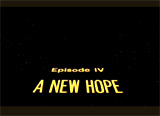


Star Wars (1977) (aka Star Wars Episode IV: A New Hope), 121 minutes, D: George Lucas
The first of a trilogy of fantasy films by writer/director George Lucas, and one of the most financially-successful films of all time, with amazing technological effects. A sci-fi adventure saga "in a galaxy far, far away", quasi-Western film, about a galactic battle between good (the rebel forces) and evil (the Imperial Galactic Empire). The characters are proto-typical: a young farmboy hero Luke Skywalker (Mark Hamill) on a desert planet, a villainous, black-garbed sinister Lord Darth Vader (voice of James Earl Jones) - an aide to the leader of the Empire Grand Moff Tarkin (Peter Cushing), a wise Jedi knight Obi-Wan Kenobi (Alec Guinness), daring starship pilot Han Solo (Harrison Ford), captured rebel Princess Leia Organa (Carrie Fisher), a furry Wookie and two robotic droids. With two sequels, The Empire Strikes Back (1980) and Return of the Jedi (1983).


Suspiria (1977, It./W. Germ.), 98 minutes, D: Dario Argento

Three Women (1977) (aka 3 Women), 124 minutes, D: Robert Altman
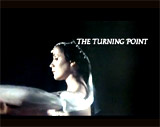

The Turning Point (1977), 119 minutes, D: Herbert Ross